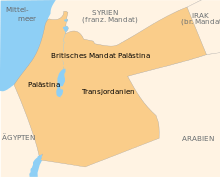Palestinians
The Palestinians (Arabic فلسطينيون, DMG Filasṭīnīyūn, from Ancient Greek Παλαιστίνη Palaistínē, Arabic فلسطين, DMG Falasṭīn [falasˈtˁiːn] or Filasṭīn [filasˈtˁiːn]) are an Arab people.
Palestinians were originally all inhabitants of the entire League of Nations Mandate for Palestine. Today, this designation is used primarily for the Arabic-speaking inhabitants of the West Bank and the Gaza Strip, as well as for their relatives living in other countries. For Palestinian Arabs in Jordan and Jewish residents of Israel, this designation is now no longer in use, even if they are "Sabre" (Jews born in Palestine) from the Mandate period. Arabs with Israeli citizenship rights are often referred to as Israeli Palestinians or as Arab Israelis. Officials in Israel prefer the second term and use Palestinian mainly for citizens of the autonomous territories. Druze as well as parts of the Bedouin from the region of Palestine, who today live predominantly in Israel, do not count themselves as Palestinians or are not counted as such by the Israeli government. Until today UNRWA defines a large part of the Palestinian people as refugees, because the status "Palestine refugee" ("palestine refugee") is inherited in the paternal line, today about 3.7 million of the total of over 9.0 million Palestinians worldwide.
Most Arab Palestinians in the Palestinian territories are Muslims (Shafiite). After above-average emigration and expulsions since the mid-20th century, the minority of Christians has shrunk from about 15% to 1.5%. Within the borders of Israel (including the parts of Jerusalem occupied by Israel since 1967), Christians accounted for 8% of the Arab population (including Druze) in 2008, down from 21% in 1950. Palestinian Christians belong predominantly to the Orthodox Church (Patriarchate of Jerusalem).
Term History
The term "Palestine" derives from the Roman province of Palestine (Hebrew פלשת, Pleshet) and was taken up by the British as a designation for their mandate territory after the end of the First World War. The first national independence efforts for the region, which was then under Ottoman rule, had been made by the Jewish side since the end of the 19th century, and by the Arab side since the beginning of the 20th century. In the Faisal-Weizmann Agreement of 1919, these aspirations were formulated in a consensual manner.
The term "Palestinian" in its current meaning has only existed since the PLO Charter of 1964. UN resolutions spoke only of "Palestinian refugees," which included Jews. However, the related provisions of the United Nations Relief and Works Agency for Palestine Refugees in the Near East (UNRWA) influenced the subsequent redefinition of the term "Palestinian". In official documents of the Federal Republic of Germany and the UN, "Palestinians" first appeared in 1974 on the occasion of Arafat's speech to the UN General Assembly.
First attempts at state formation in the mandate area
→ Main article: League of Nations Mandate for Palestine
See also: Palestinian Territories, Nakba and Expulsions of Jews from Arab and Islamic Countries
On March 25, 1923, Transjordan (78% of the total Mandate territory) became semi-autonomous and thus inaccessible to Jewish settlement. On March 22, 1946, Transjordan became independent from Britain and was named the Hashemite Kingdom of Jordan in 1950. In the wake of the escalating Middle East conflict, several different proposals for partition into an Arab and a Jewish state were put forward, culminating in the UN Partition Plan in 1947. After the end of the British Mandate in May 1948, Israel was founded by resident as well as immigrant Jews, while the Arab side rejected the UN partition plan, claimed the entire territory, and started the Palestine War. Jordan subsequently annexed the West Bank and the eastern part of Jerusalem with the Old City; the Gaza Strip fell under Egyptian occupation. Since the 1967 Six-Day War, the West Bank has been under Israeli control with limited Arab-Palestinian autonomy. Under the Sharon Plan, Gaza was vacated by Israel in 2005 and is currently controlled by the Islamist Hamas; today there is no Jewish population in Gaza.

The Mandate of Palestine in the borders from 1920 to 1923 (including Cis- and Transjordan)
Questions and Answers
Q: Who are the Palestinian people?
A: The Palestinian people are Arab people from Palestine. In the past, "Palestinians" could also be used as a name for Jewish people who lived in Palestine.
Q: What is the estimated total population of Palestinians?
A: The total Palestinian population, including descendants, is estimated at approximately 10 million.
Q: Where do most Palestinians live today?
A: Roughly half of all Palestinians continue to live in the region of historic Palestine, an area encompassing Israel proper, the West Bank including East Jerusalem, and the Gaza Strip and Jordan.
Q: What language do Palestinians typically speak?
A: The traditional vernacular of Palestinians is the Palestinian dialect of Arabic. For those who are citizens of Israel, many are now also bilingual in Modern Hebrew.
Q: What religion do most Palestinians follow?
A: Most Palestinians are Muslim, particularly of the Sunni branch of Islam, and there is a significant Palestinian Christian minority of various Christian denominations, as well as smaller religious communities.
Q: When did widespread use of "Palestinian" begin to refer to a nationalist concept? A: The first widespread use of "Palestinian" as an endonym to refer to the nationalist concept began prior to World War I in 1921 with demand for national independence issued by Syrian-Palestinian Congress on 21 September 1921.
Search within the encyclopedia